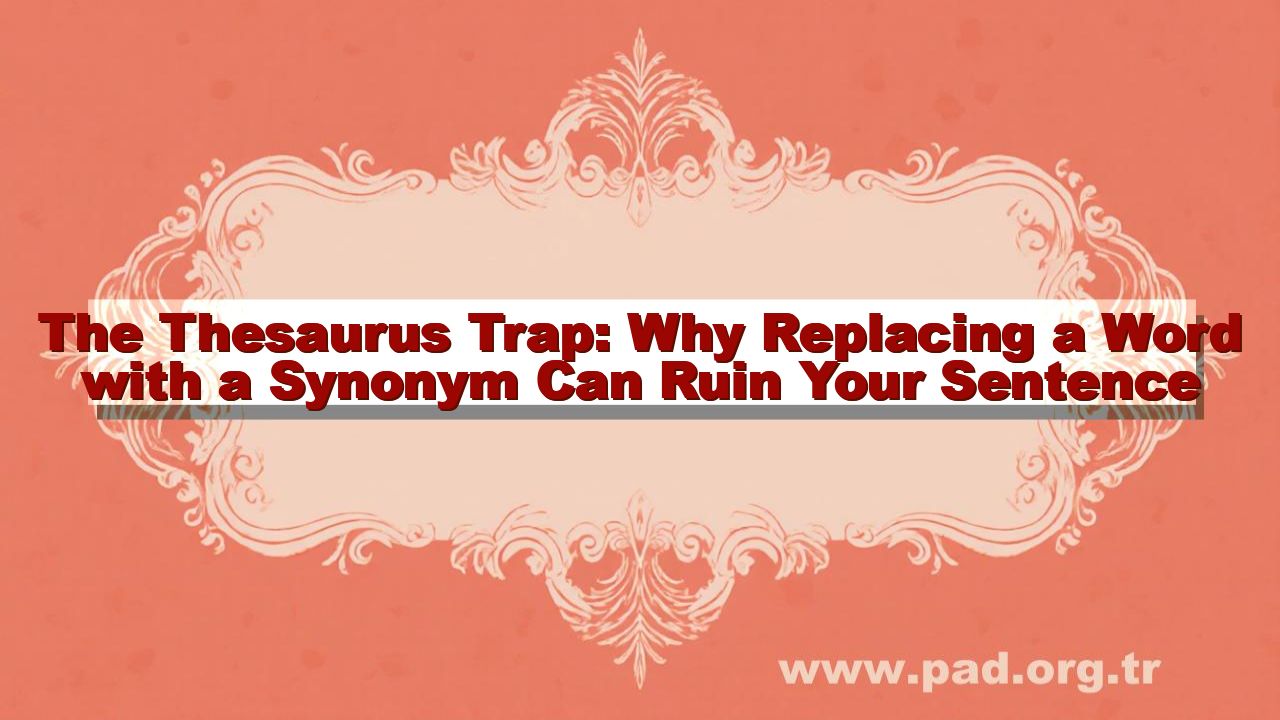You know that feeling when you’re writing, and you desperately want to sound a little more sophisticated than you actually feel? So you hit the thesaurus, pick a gigantic, obscure word, drop it into your sentence, and immediately feel like a literary genius? Well, stop. Right now. The simple truth about The Thesaurus Trap is that substituting a common word with an unfamiliar synonym almost always ruins the flow and the meaning of your writing, because no two words in the English language truly mean the exact same thing; they all carry different baggage, or connotation. Due to the fact that a thesaurus is completely blind to context and tone, using it as a direct word-swap tool is a guaranteed way to make your text sound awkward, pretentious, and frankly, a little unhinged. The primary reason you should resist the urge to elevate your vocabulary with a simple click is that you risk losing the precision and sincerity that your original, simpler word already possessed. I once tried to replace “walked” with “perambulated” in a serious business email, and my boss just replied with a single, perfectly placed question mark—it was brutal, but I learned my lesson fast.
Why the Thesaurus is a Semantic Minefield
The danger here is not that you don’t know the word, but that you don’t know the flavor of the word. A thesaurus gives you potential matches, but it cannot tell you the word’s register—is it formal, informal, technical, or archaic? Since that is the case, you’re essentially gambling with the entire tone of your piece. If you want to say something is “sad,” a thesaurus might suggest “lugubrious,” but unless you’re writing a gothic novel, using “lugubrious” will just make your reader snicker. The goal of great writing is seamless communication, and a jarring word choice, often caused by falling into The Thesaurus Trap, is the ultimate obstacle to that goal.
We have to accept the fact that a dictionary can give us the definition of a word, which is merely its denotation, while a thesaurus only offers a list of other words, ignoring the crucial, subtle, and context-dependent feeling or association—known as connotation—that each one carries, making it an incredibly dangerous tool when used by an inexperienced writer trying to sound overly sophisticated. That simple distinction between denotation and connotation is what separates a smooth, human-written sentence from one that screams, “I just right-clicked and replaced a word.” You should absolutely be reading more and expanding your vocabulary naturally, not forcing awkward synonyms into your work.
The Cruelty of Connotation
This whole mess boils down to connotation. Take the word “skinny.” You want to swap it out for something more positive, so you open the thesaurus and see “gaunt.” While both technically mean “thin,” “gaunt” carries a connotation of unhealthy thinness, illness, or even starvation—a totally different vibe than simply being slight or lean. Similarly, you might want to replace the word “group” with “clique,” but a clique implies exclusivity and sometimes even mild hostility, something a simple “group” does not. This is why replacing a word with a synonym can ruin your sentence: you’ve lost the specific emotional or social nuance of your original word. Only experience and wide reading can truly teach you the specific aura of a word, which is a key component of real word choice mastery.
Recognizing Semantic Distance
When you’re tempted to reach for a fancy word, you need to ask yourself about the semantic distance between your original word and the potential synonym. Are they close cousins, or are they distant acquaintances? For example, “happy” and “joyful” are close. You can usually swap them without causing a crash. But “happy” and “ecstatic” are much further apart; the latter implies a feverish intensity that might be inappropriate for just describing a pleasant day. The mistake many writers make is assuming the thesaurus suggestions are interchangeable at every level of intensity and formality. They are not. If your goal is to make your reader feel comfortable and focused on your core idea, you must choose words that fit the sentence’s furniture, not words that jump out and grab attention just for the sake of it.
Because professional writing, whether in emails, blog posts, or long-form articles, relies on building trust and conveying ideas without any unnecessary friction, the catastrophic effect of using an overly flamboyant synonym like ‘pulchritudinous’ when a simple word like ‘beautiful’ would have done the job, is that the reader immediately stops focusing on the message and starts focusing on the awkward, jarring word choice. When you see a word that feels slightly off, it breaks the spell of the writing, which is why we must treat The Thesaurus Trap with such caution.
The Thesaurus Trap in 2025 Writing
The challenge with avoiding the synonyms trap is actually getting worse in 2025. With so much AI-generated content floating around—which often relies on predictable word swaps to avoid repetition—readers are now highly attuned to language that sounds manufactured or unnecessarily inflated. Using an awkward synonym, a classic hallmark of bad writing, now reads to many people like you simply hit an “elaboration” button. Your readers are getting smarter, and they can spot the difference between genuine word choice mastery and a cheap trick. You want your text to sound authentically human and conversational, which means favoring the clear, correct word over the overly ornate one every single time.
As of late 2025, the biggest semantic trend we’re tracking is the continued push toward clarity and directness in all digital communication. This is especially true in technical and business writing where any ambiguity—the exact kind of ambiguity caused by poor synonym choice—can lead to confusion and poor results. We are seeing a significant backlash against “jargon creep,” which often uses obscure or overly formal words when simpler, active-voice language would be better. For instance, the preferred term in reporting is moving away from synonyms like “utilize” and firmly toward the simpler, clearer “use.” The key lesson remains: if the synonym doesn’t clearly add meaning, tone, or precision, then it’s actively subtracting from your sentence’s quality. This renewed focus on plain language makes it easier than ever to fall into The Thesaurus Trap if you try to over-engineer your phrasing.


